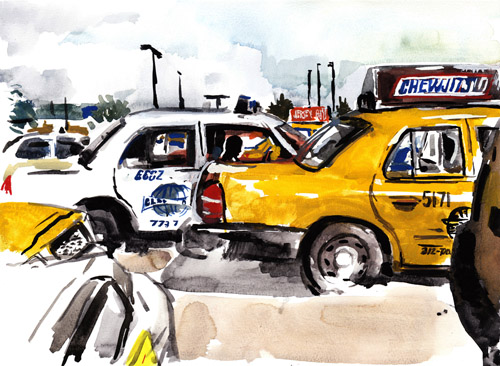It was recently suggested by The New York Daily News‘s Alexander Nazaryan that Jonathan Safran Foer’s purported “truth about human experience” could be instantly dismissed due to Foer not really knowing a life without bona-fide hardship. Nazaryan came to this viewpoint not necessarily because he is bitter (he claims to be, but I don’t think he is), but because he was raised in Soviet Russia.*
Fortunately, one recent book is committed to a less abominably assumptive approach to human existence. Like Nazaryan, artist, author, and cab driver Dmitry Samarov also experienced a childhood in Soviet Russia. And I suspect that this background is one very salient reason why Samarov’s insights into everyday life in Chicago are so real and winsome, rather than trite and didactic like Foer. Eschewing prepackaged claims of Taxicab Confessions authenticity (although the show is mentioned twice), Dmitry Samarov’s Hack (University of Chicago Press, $20) is a slim yet thoughtful volume on what it is to live as a taxi driver. The book bristles with an intriguing street poetry, referring to a gas station’s “welcoming neon glow” as “fool’s gold” when Samarov describes the difficulties of finding a place to relieve himself and depicting the unusual dernier cri (“a straw cowboy hat and a green Day-Glo bracelet”) which elude the monied charlatans who hole themselves up in vacuous manses. Samarov is clearly interested in people, but, like the prostitutes, the journalists, and the psychotherapists who cater to their clients in similar fashion, he knows very well how his fares perceive him. He registers his observations in a rapid-fire yet unpretentious manner (many of his anecdotes originated on a blog), as if he has only a few minutes to capture a few sentences (or sketch one of the many illustrations accompanying his stories) before hustling for the next fare.
Samarov is candid enough to express his understandable self-interest, describing how he wants his cheeseburger more than an “angry man with a backpack [who] marches right up to the window and demands service” at a McDonald’s which prohibits walk-ups (and which generates a quick fare stream for wayward cabs in the area) while also showing us his reticence to reveal certain personal details to his more probing clients.
And why should the hack spill? After all, when we enter a cab with the idea of entering a conspiratorial trust with the driver, how much of our taxicab conversations do we truly remember? Isn’t there something inherently troubling about placing our trust with a stranger like this? Perhaps. This may be one of the reasons why so many “confessions” of this sort often depict the taxi driver as some dutiful stoic who has seen it all. But this take severely underestimates the hack’s ability to understand the implications of his observations. As Samarov himself writes when trying to peg a woman pushed into the back of his cab by a disheveled old man, “There’s no polite way to broach such a subject, so I content myself with speculating.”
Samarov is willing to impart his fears and dangers, even when they reveal unexpected thoughts about on-the-job dignity. Of dealing with incompetents and ireful types on the road, he writes, “I wouldn’t be caught dead out here if there wasn’t money at stake. The fact that the masses submit to it of their own volition makes me question my membership in the species.” Does this need for the take, often ruthlessly pared down by a cashier when checking the cab in, make Samarov any less superior to Foer? Not at all. But it’s refreshing to see Samarov marvel at the universe even as he seems conflicted about it. It’s this marvelous duality of being alive that books, especially in the hands of the prissy and the uptight, too frequently take for granted.
* And if you’re truly on the fence about whether or not Foer is a loathsome human being and/or an astonishingly overrated individual, consider the fact that Foer had the audacity to apply, and win, one of the coveted Cullman Center fellowships (which awards a $65,000 stipend, an office, and considerable resources to each winner) offered by the New York Public Library this year — this when Foer himself owns a $6.75 million brownstone in Park Slope (purchased in large part through the family’s coffers), is doing extremely well with the Extremely Loud & Incredibly Close film rights and foreign sales, and this after Foer’s equally pansified wife, Nicole Krauss, won a Cullman grant two years prior to her husband. A source informs me that Foer resigned from the fellowship, which explains why his name is no longer listed among this year’s fellows. Still, why would any remotely decent person do this? I suspect the answer is quite self-explanatory. If you go for an evening stroll through Prospect Park, especially when it is colder and more desolate in the wintertime, you can listen to the gelid pelt of Marie Antoinette-like sweat oozing from the west without surcease from Nicole Krauss’s privileged pores, which is siphoned into a special stock for the children so that they too can sup from the free ride tureen well into early adulthood. Given all the recent dialogue involving the richest 1% taking everything from the remaining 99%, it’s astonishing that the Foer family’s unrelenting selfishness and unfathomable avarice has gone without remark or rebuke by the literary community. But I digress.

A few folks suggested this to me when I visited Chicago. I’ll be sure to pick it up now.